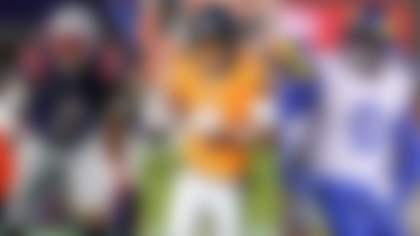WASHINGTON -- The head of the NFL Players Association said Tuesday his union has differences with the NFL over how to address head injuries suffered during pro football games, but they're not fighting about it.
One day before a congressional hearing about head injuries in professional football players, union head DeMaurice Smith credited the NFL for doing a "tremendous job" to improve player safety in the past five years.
"This is not a battle between us and the league," Smith said.
But he also complained that he didn't have access to the medical information the NFL collects on its players. That information, he said, can be used "to come up with better, safer ways to not only deal with their exposure to injury on the field, but also to improve their lives off the field."
NFL spokesman Greg Aiello said he wasn't aware of any medical information the league isn't sharing with the union.
"We share a great deal of medical information with the union and the players have full access to their medical records," Aiello said in an e-mail to The Associated Press.
Smith will testify along with NFL commissioner Roger Goodell; Rep. Bill Pascrell, a New Jersey Democrat and co-chairman of the Congressional Brain Injury Task Force; medical experts and former players, including former New York Giants running back Tiki Barber.
Among the medical experts testifying are researchers from the Boston University School of Medicine, who announced last week that a football player who never competed beyond the college level suffered from a degenerative brain disease previously discovered in former NFL players.
It was the first time an advanced case of chronic traumatic encephalopathy was found in a player who did not advance past the college game -- suggesting athletes could be at risk for CTE even if they don't play professionally. CTE, originally found in boxers, is caused by repetitive trauma to the brain, with similar symptoms to Alzheimer's disease.
Ahead of the hearing, Hall of Famer Mike Ditka sent a loud and clear message toward Capitol Hill and the league during a news conference Tuesday to announce his Gridiron Greats Assistance Fund is expanding its medical program.
"You can run studies for the next 20 years. Somebody's going to say, 'It's directly related, well it's not directly related.' Well, who cares? Let's take care of them," Ditka said.
A Hall of Fame player who later coached the 1985 Bears to the Super Bowl, Ditka said he was contacted about speaking at the hearing but was unable due to prior commitments. In the past, Ditka has criticized the players' association for ignoring the medical needs of former players with serious injuries who can't afford to pay for their care. His stance has softened now that Smith is leading the union.
Ditka is "amazed" to see how many players have already suffered season-ending injuries this year even though the league "has done a great job" trying to protect them.
Even so, he said, "There's got to be a better program going forward for the former players because the league is about the players in the league today, the players who were in the league and the players who will be in the league."
The hearing will look at the lasting impact of head injuries, how to limit them and how to compensate players and their families. A preliminary study done for the NFL suggested retired pro football players may have a higher rate than normal of Alzheimer's disease or other memory problems. Lead author David Weir, who is among the witnesses for Wednesday's hearing, has said the results show the topic is worth further study but they do not prove a link between playing football and later mental troubles.
When the study was released, the NFL said further study is already under way and stressed that memory disorders affect many men and women who never played football or other sports.
Dr. Thom Mayer, the union's medical director, said at the news conference that football is a sport where 100 percent of the participants will get injured.
"Not everyone has a head injury, but it's common enough that it's the thing that we're most concerned about," he said.
Mayer said that rules changes and improvements in helmet technology have helped, but he'd like to see further improvements in how to handle players both immediately after and in the days following a concussion, and in decisions on when to return to play.
"It's an ongoing battle -- not between us and the NFL -- but between what we know and what we don't know in order to protect our players," he said, adding that he was confident that the sport will get to a point where head injuries will be far less dangerous.
"No one is saying we should ban football -- at least not yet," Smith said. "But why can't we have a great game that's safe for our players? Why can't we live in a world where the National Football League becomes the standard bearer on this issue?"
On the labor front, Smith said he's proposed to the owners that if there isn't a deal on a new contract by the middle of January, the two sides should conduct five days of concentrated meetings.
Aiello, the NFL spokesman, responded that the league will meet with the union "as often as we can" to get a deal.
Copyright 2009 by The Associated Press



